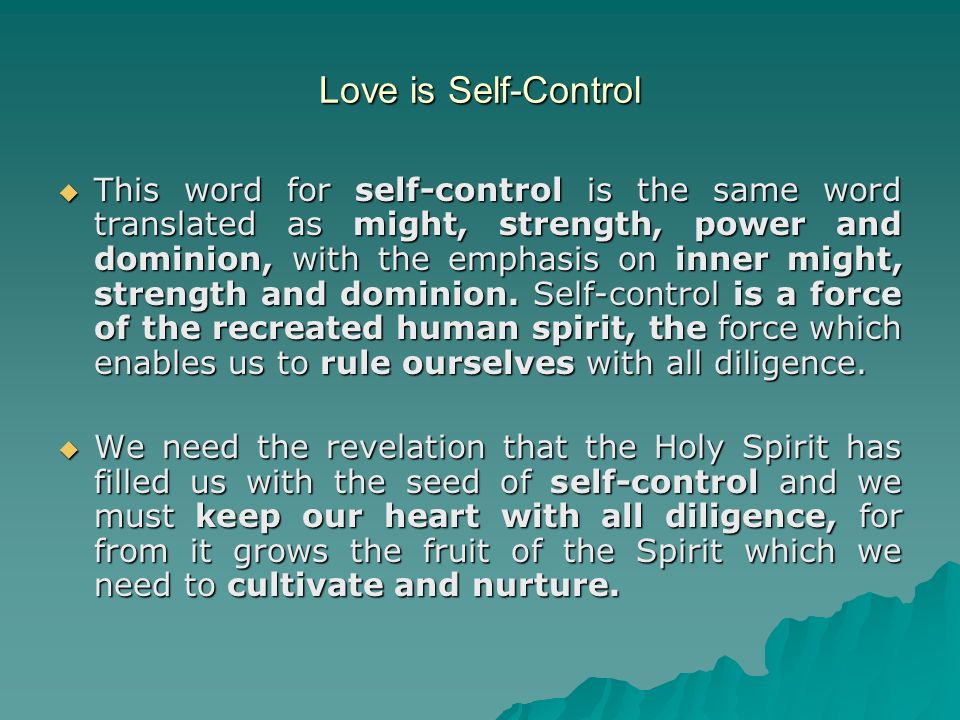“But the fruit of the Spirit is love, joy, peace, forbearance, kindness, goodness, faithfulness, gentleness and self-control. Against such things there is no law.” Galatians 5:22-23
I suppose it requires a bit of self-control to write anything about self-control. So, seriously, what qualifies me to write about it? Because this is the fruit of the Spirit I struggle with most. To keep my heart with all diligence as the graphic below instructs, I must be submissive. (Raise your hand if you absolutely love being submissive.)
I believe the fruit of the Spirit don’t come to us in the order they’re listed in Galatians. In other words, we aren’t first given love, then joy, then peace, etc. The Holy Spirit grows each of them simultaneously because we always need each of them to live a holy life.
Certainly, love leads the way. Without the same love the Lord commands, we’ll never understand the other fruit.
“Teacher, which is the greatest commandment in the Law?” Jesus replied: “‘Love the Lord your God with all your heart and with all your soul and with all your mind.’ This is the first and greatest commandment.” Matthew 22:36-40
“The second is this: ‘Love your neighbor as yourself.’ There is no commandment greater than these.” Mark 12:31
When Paul the apostle said we would grow in grace according to God’s plan, he was aware of God’s commandment given to the children of Israel. He knew Jesus had also commanded that love each other. “As I have loved you.” “A new command I give you: Love one another. As I have loved you, so you must love one another.” John 13:34
Describing what self-control looks like isn’t easy. We may be exercising self-control without anyone around us even knowing it.
- At the restaurant buffet, you select only one dessert.
- Your teenager grumbles about his punishment for breaking the rules and you refrain from threats of making the punishment more severe just because you can.
- In traffic, although you’re in a hurry, you stop and wave the driver into the lane ahead of you.
- You decide you don’t need to have the last word.
My default mode is “Self,” so in any given circumstance, without the help of the Holy Spirit, I’ll think of my desires first. The circumstance may be pleasant, or it may be unpleasant, but I’ll find some way to make it all about me. Self-control was—for me anyway—first practiced with a white-knuckle grip. Eventually the Spirit only needs to whisper for me to loosen my grip. I give up what I want for the sake of harmony.
Most good ideas are simple ones. As my relationship with God became deeper, I could see how his ideas are simple; we’re the ones who complicate things. The idea of self-control is simple: it comes down to submitting to God and to others. However, carrying out a simple idea isn’t always easy. When we submit to God, allowing the Spirit to work in our lives, he makes it easier and easier to submit to others until it becomes a natural response.
For my next feat of self-control, I’ll stop writing this blog post before I start to sound like a wind bag.
Be a blessing to someone today.










 When Jesus healed a woman who had suffered bleeding for twelve years he told her, “Daughter, your faith has healed you. Go in peace.” (Luke 8:48) Likewise, a local woman known for her sins crashed a party and poured expensive perfume on Jesus, washing his feet with her hair. While others criticized her, Jesus affirmed her. “Your sins are forgiven. Your faith has saved you. Go in peace.” (Luke 7:48, 50)
When Jesus healed a woman who had suffered bleeding for twelve years he told her, “Daughter, your faith has healed you. Go in peace.” (Luke 8:48) Likewise, a local woman known for her sins crashed a party and poured expensive perfume on Jesus, washing his feet with her hair. While others criticized her, Jesus affirmed her. “Your sins are forgiven. Your faith has saved you. Go in peace.” (Luke 7:48, 50) 




 Through a look at the fruit of the Spirit mentioned in Galatians 5:22-23, Annie Paden teaches how to both nurture and share love, joy, peace, patience, kindness, goodness, faithfulness, gentleness, and self-control.
Through a look at the fruit of the Spirit mentioned in Galatians 5:22-23, Annie Paden teaches how to both nurture and share love, joy, peace, patience, kindness, goodness, faithfulness, gentleness, and self-control.